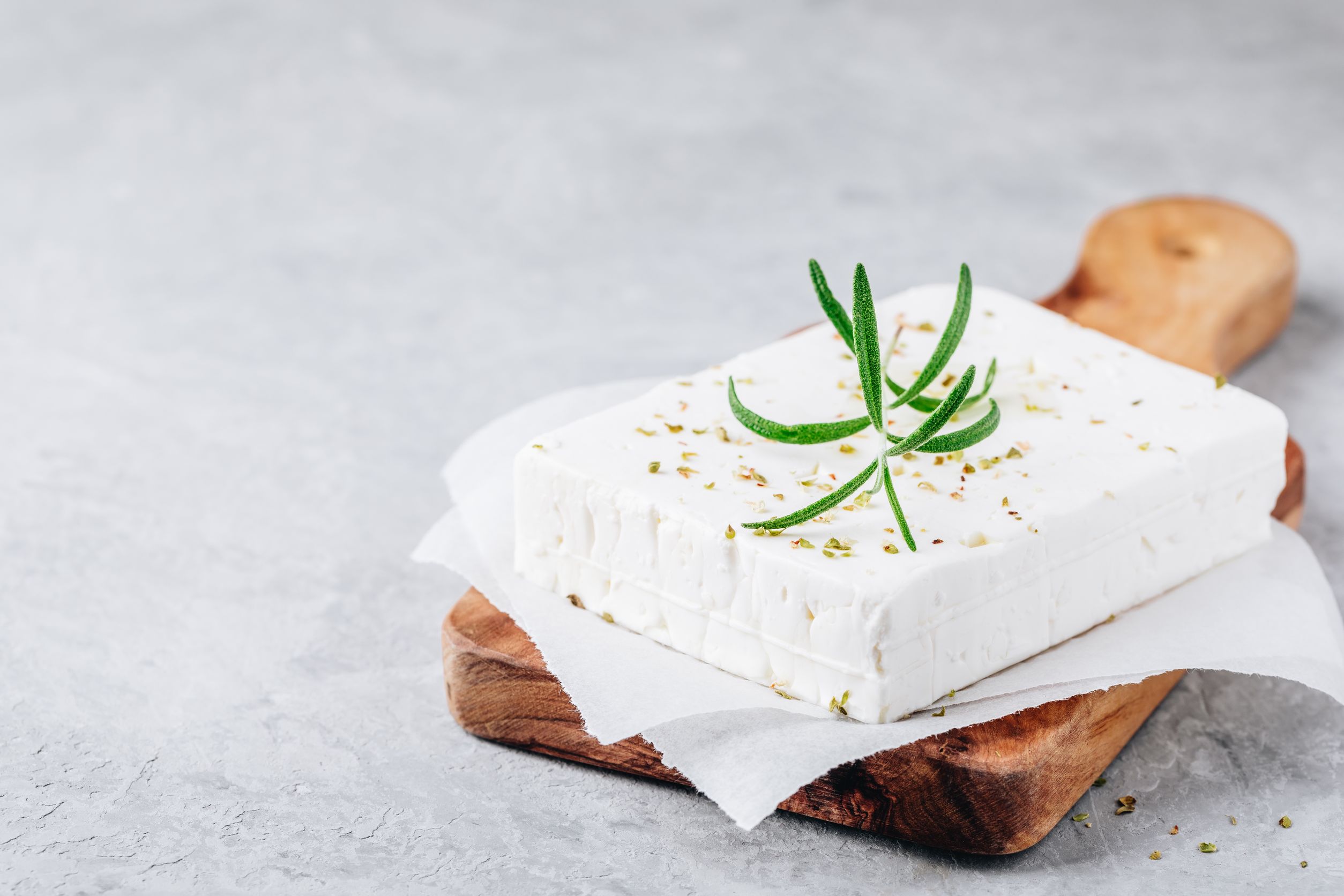
See what I did there?! Feta Cheese is undoubtedly one of the most famous of the Greek cheeses. In fact, Feta comprises 70% of Greek cheese consumption. The cheese is protected by the European Union legislation and only those cheeses manufactured in Macedonia, Thrace, Thessaly, Central Mainland Greece, the Peloponnese, Lesvos, and Island of Kefalonia can be called feta. Similar cheeses produced elsewhere in the eastern Mediterranean, around the Black Sea, and outside the European Union, are often called white cheese.
In 2013, an agreement was reached between the European Union and Canada in which feta made in Canada would be called ‘Feta style cheese’ but would not depict anything evoking Greece on the label. Canadian companies using the “feta” name before October 2013 can continue to do so.
Why is it So Delicious?
A soft brined, white cheese with either no holes or small holes, Feta has a compact touch, few cuts, and no skin covering it. It’s usually formed into large blocks, which are then submerged in brine, helping to preserve the salty, tangy flavour that ranges from mild to sharp. Feta cheese is traditionally categorized into firm and soft varieties where the firm variety is tangier and considered higher in quality. The soft variety is almost soft enough to be spreadable, mostly used in pies and sold at a cheaper price.
High-quality feta should have a creamy texture when sampled, with aromas of ewe’s milk, butter, and yogourt. On the tongue, it’s tangy, slightly salty, and mildly sour, with a spicy finish reminiscent of pepper and ginger, as well as a hint of sweetness.
Vince’s Market has its own variety of Vince’s Own Feta and it’s delicious!
Feta Facts
Just in case you’re not really up on your Feta Facts, we’ve got you covered!
- To be called feta, it must be produced in Greece. Feta is a legal designation, similar to Champagne or Roquefort. Romania, Bulgaria, France, and Denmark, among others, make similar cheeses, but they can’t be called feta.
- The word feta is derived for an ancient Greek word meaning slice.
- Feta cheese can be made from sheep’s milk or a combination of sheep and goat milks. Most cheese lovers say the best comes from sheep’s milk. But keep in mind, true Feta cheese will contain, at most, 30% goat’s milk.
- Feta is one of the world’s oldest cheeses. Homer writes about it in The Odyssey.
- Feta cheese is about 25% fat, of which about two-thirds is saturated fat.
- Feta is high in calcium and vitamin B12
- A small cube of feta cheese of around 35g has about 100 calories
- By Greek law, feta is cured at least three months in brine.
What can you do with Feta that might not be on your radar?
- Sprinkle over your favourite potato dish—it’s great on roasted potatoes!
- Add it to your pizza
- Use it as part of your stuffing when you’re making Stuffed Peppers, Stuffed Mushrooms, or Stuffed Zucchini
- Try it on your next burger
Oven Baked Macaroni and Feta Cheese
Ingredients:
- 1 box (454g) Elbow Macaroni, cooked according to the directions on the box
- butter for greasing the pan
- 1 tablespoon olive oil
- 2 cups crumbled feta cheese
- 5 eggs
- 2 1/2 cups milk
- salt and pepper, to taste
For the Topping:
- 2 tablespoons olive oil
- 2 cups fresh breadcrumbs
Instructions
- Preheat oven to 400°F
- Cook the macaroni in salted water. Drain.
- Generously butter a 13-by-9-inch glass baking dish.
- Pour cooked macaroni into baking dish and toss with 1 tablespoon olive oil.
- Mix in crumbled feta cheese.
- In a medium mixing bowl, whisk together the eggs, milk, salt, and pepper.
- Pour the egg mixture over the macaroni; mixture should come about 3/4 of the way up and shouldn’t cover the macaroni completely.
- Heat the olive oil in a frying pan.
- Add the fresh breadcrumbs to the pan and cook over medium-high heat, stirring frequently, until browned.
- Remove from heat and spread the breadcrumbs over the macaroni.
- Bake for 40 to 45 minutes, or until the custard sets and edges are browned.
- Let cool for 15 minutes before serving.
We’d love to hear from you! Do you love Feta, or have a fantastic recipe to share?? Leave us a comment here or head on over and join in the conversation on Facebook (please ‘Like’ the page if you’re so inclined) and Twitter. If you haven’t already signed up to receive our weekly newsletter which includes our blog, the weekly product feature, the weekly Coterie savings, and our recipe of the week delivered right to your inbox, you’ll find the signup by clicking here.
Let’s catch up soon,
Julie







